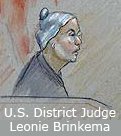 U.S. District Judge Leonie Brinkema on Monday put the death penalty case against September 11 conspirator Zacarias Moussaoui on hold for two days, declaring angrily she found it very difficult to proceed since a government lawyer improperly shared information with witnesses.
U.S. District Judge Leonie Brinkema on Monday put the death penalty case against September 11 conspirator Zacarias Moussaoui on hold for two days, declaring angrily she found it very difficult to proceed since a government lawyer improperly shared information with witnesses.In court without the jury present, Brinkema said the lawyer, Carla Martin, violated a court rule by sharing details of trial proceedings with potential witnesses.
Brinkema said Martin had "improper communications" with seven witnesses from the FAA -- three who were to be called to testify by the government and four by the defence.
Martin works for the Transportation Security Administration and was helping the Federal Aviation Administration prepare FAA witnesses involved in the trial, prosecutors said.
Her e-mails, which were released by the court, showed that Martin sent potential witnesses transcripts of part of the trial and also coached them on how to handle certain questions related to aviation security. More details can be found here.
Brinkema issued an order in February forbidding witnesses to follow trial proceedings or read transcripts.
Judge Brinkema was appointed by President Clinton in 1993.
UPDATE: More facts, courtesy of the NY Times: "Judge Brinkema, who had earlier tried to strike the death penalty from the trial only to be overruled by an appeals court...."
The judge's order is here.
6 comments:
Is the judge's order in this case unusual? Disallowing witness prep seems rather strange to me.
Rick:
The order which was violated is Judge Brinkema's interpretation and explanation of the rule of sequestration of witnesses tailored to the exigencies of this case.
I am pretty sure it resulted from a failure of the parties to agree on how to apply the rule to the facts of this case.
The rule of sequestration of witnesses may be invoked by either party at the beginning of a trial. The rule's purpose is to make sure that a witnesses testimony is not influenced in any way by what has happened in court or by other witnesses' testimony. Therefore, it requires all witnesses to be insulated from the rulings on evidence and procedure and the substance of testimony prior to the witness's appearance on the stand.
What happened here was a serious breach of the rule of sequestration. Even if Judge Brinkema had not issued her order, this conduct would be a serious breach of the rule of sequestration.
The problem is exacerbated by the identity of the individual breaching the rule and the substance of her communications with upcoming witnesses. She clearly tipped them off to rulings, to the substance of prior testimony, and to the cross examination tactics of the defense team.
No experienced trial lawyer with any integrity would allow such a thing to happen.
I am confident the AUSA who is lead counsel is saddened and angry at this development. Although he is not at fault, this event will dog him, and he will unfairly be forever identified with this foolishness on the part of the TSA attorney.
This man is going to die of old age before he ever sees death row.
I wonder if the TSA attorney was aware of the judge's ruling before she wrote the emails?
Put another way, I wonder if the DOJ attorney shared the judge's ruling with the TSA attorney prior to the time she wrote the emails?
Fresh Air, Thanks for the Andy McCarthy link. His comments are enlightening.
Brylun:
If he didn't he should have if he knew the TSA attorney was acting as a liaison with the FAA witnesses.
This sort of like a spoliation (destruction of evidence)issue with discovery which happens from time to time in civil cases. If the lead counsel isn't careful, the client may get rid of what they think is damaging evidence without counsel's knowledge. If the other side finds out, it is always bad for the case.
Post a Comment